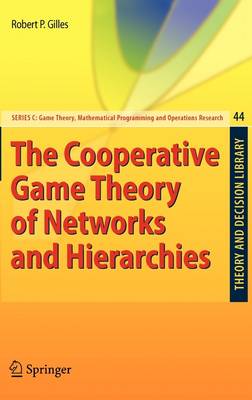Theory and Decision Library C
2 primary works
Book 12
Book 44
The book brings together an overview of standard concepts in cooperative game theory with applications to the analysis of social networks and hierarchical authority organizations. The standard concepts covered include the multi-linear extension, the Core, the Shapley value, and the cooperative potential. Also discussed are the Core for a restricted collection of formable coalitions, various Core covers, the Myerson value, value-based potentials, and share potentials. Within the context of social networks this book discusses the measurement of centrality and power as well as allocation rules such as the Myerson value and hierarchical allocation rules. For hierarchical organizations, two basic approaches to the exercise of authority are explored; for each approach the allocation of the generated output is developed. Each chapter is accompanied by a problem section, allowing this book to be used as a textbook for an advanced graduate course on game theory.

